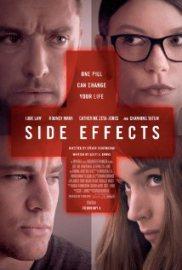
Side Effects (2013)
Director: Steven Soderbergh
Writer: Scott Z. Burns
Why I Watched It: I am a fan of several of Soderbergh’s previous films, and I was curious about this one.
My Reaction, In a Nutshell: Never has my reaction to a film gone downhill so dramatically. At the beginning, my response was: “Hey, this is going to be great!” I was captivated by the interesting characters and masterful cinematography. Later in the movie, my response shifted to occasionally rolling my eyes and muttering, “Um … seriously?” By the end, I’d devolved into repeatedly shouting “Oh for fuck’s sake!” at the screen. I guess if I really wanted to reframe that nicely I could say, “I was a hell of a ride.”
An Irrelevant Personal Note:
I make no secret of the fact that I know far more about psychoactive medication that any non-medical professional ought to know. Depression/anxiety doesn’t just run in my family — it gallops. Psychoactive medications have been life-saving for many people, including myself and people who are very close to me. But there is a tremendous amount of trial and error involved, and sometimes competent doctors go out on a limb and prescribe something relatively untried. It’s scary, grueling, and almost invariably complicated by side effects you’d rather not deal with, but — if you’re lucky — well worth it.
I’m fairly open about this stuff because I think it’s something people should talk about, so others struggling with these issues know they don’t have to hide in the dark. But out of respect for readers (and by “respect,” I mean I want to keep the few readers I’ve managed not to run off), I’ll spare you my nasty war stories about medications and side effects.

Review:
Emily Taylor (Rooney Mara) has been through the wringer. Her husband, who she wed after a whirlwind romance, has just been released after a four-year stint in the hoosegow for insider trading. While he was in the pokey, she suffered a miscarriage. It isn’t surprising that she appears to be struggling with severe depression.
After an unsuccessful suicide attempt, she connects with a new psychiatrist, Jonathan Banks (Jude Law). He makes the risky decision not to hospitalize her after she crashes her car into the wall of a parking garage. Later she admits to having suicidal feelings in a subway station, and he still doesn’t admit her. In my opinion, that was just sheer dumb-ass stupidity, but I digress. The good doctor tries several medications. After an unsuccessful stint on Zoloft, Emily tries an experimental new medication called Ablixa.
I felt like I was watching three completely different movies here. Unfortunately they aren’t combined seamlessly — it’s a jumbled mess. First, there’s an interesting, beautifully shot story with intriguing characters. By the time I saw Dr. Banks helping a young Haitian who’d seen the ghost of his dead father, I was hooked.
Then the film morphs into something else. A plethora of potentially weighty issues is thrown at us. The risks and benefits of antidepressant medications. Inadequately tested drugs being used on vulnerable patients. Whether all the gifts and payments pharmaceutical companies bestow onto psychiatrists represents a grossly unethical — and potentially dangerous — conflict of interest. All these issues are worthy of discussion, but here they were dealt with quickly and in a way that seems too slickly packaged. But I was still enjoying the film, and I felt like the writer and director could successfully bring it home.
Then it dissolves into a twisty thriller — kind of like Basic Instinct on a shiz-load of psychiatric meds. That’s when they lost me. I’ll be honest — I love a good thriller. I appreciate a writer or film-maker who keeps me guessing, and I love being outsmarted by the storyteller. But the twists have to be genuinely rooted in the story. The viewer ought to be able to say, “Ah! Damn! I should’ve seen that coming.” Here I wasn’t outsmarted by the storyteller — I was just confused and annoyed by a film that kept changing the rules and pulling plot twists out of left field.
On the positive side, the cinematography was consistently wonderful, and the acting was quite good. I was especially happy to see Ann Dowd (Compliance) offering another outstanding performance. And it was great to see Polly Draper again. (I watched her in Thirty Something, back in the day.) Sadly, I was left with the sense that all this good stuff was wasted on a story that lacked consistent direction, played false with viewers by concocting implausible twists, and delivered something substantially weaker than what was promised.
